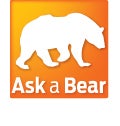Ask a Bear: Bivys in Bear Country?
When I sleep in my beloved bivy, am I just wrapping myself up like a six-foot bear burrito?
Q: On the trail, I don’t carry a tent because I am extremely fond of my bivy sack: It weighs almost nothing, it keeps my sleeping bag dry, and on a fine night I fall asleep with my eyes on the Milky Way. I try to keep the clothes I wear to cook in the bear canister (with the exception of the down jacket that I need to wear when I cook but also need to wear in the sleeping bag). That being said, when I sleep in my beloved bivy, am I just wrapping myself up like a six-foot bear burrito

I spend most of my time in black bear country. Would your advice for me be different in grizzly country?
–Bivouac Jack
A: Hoo boy, I can appreciate a good bivy—as a bear, I pretty much do it all the time (minus the sack) until bedding down for winter. But there are some risks involved when you bivy camp in bear country.
While it’s true that in most cases I would leave you alone either way, a tent provides a serious psychological barrier when I investigate potential food sources. Most data shows that people are far more likely to be attacked when sleeping outside a tent than when within. I’m opportunistic, and you being completely exposed creates more opportunity than hiding yourself behind a barrier, however flimsy.
Not that a tent is perfect protection: If I’m curious or hungry enough, I’ve been known to claw at the walls and sides of a tent. This is why it’s important to keep yourself away from the walls (one to two feet is usually good).
If you’ve followed proper food storage and prep precautions (which it sounds like you do), the likelihood that I’ll mess with you even in burrito form is small, especially in black-bear country. But in heavily populated grizzly country, I’d ask you to consider taking a tent or at least a tarp. I could be bigger and less easy-to-scare grizz, and in that case, you’ll value that extra layer of protection. Bivy camping is still OK, you just need to know that you’re taking a bigger risk. Either way, make sure and camp smart: Stay away from brushy areas near human or game trails, and don’t camp near travel corridors like river banks. Choose open areas, and you may want to keep an eye on an escape tree you can climb in case an aggressive grizz does show up.
Enjoy the view—I know I do.
—BEAR
